[This is a guest blog post by our new DRS Facilitator Sarah Janac. The Research Data Service is one of a number of digital research services at the University of Edinburgh.]
Many researchers rely on digital tools and computational methods for their work, and, for this, the University offers several state-of-the-art facilities. However, it is easy to get lost in the sheer number of tools and providers. Digital Research Services are here to help.
Who are Digital Research Services (DRS)?
Digital Research Services offer a single point of access for all things digital research across the University. We connect researchers with the digital tools and services from Information Services and other providers. We make it our priority to deliver tailored support so that researchers get the best use of the resources out there.
We love the research lifecycle!
The research lifecycle is the cornerstone of our work. We collaborate with service providers from Information Services Group and beyond to support you in all stages of your research and anticipate challenges which might come up. For instance, we can support you in developing your funding application, ensuring you fully cover the costs related to the digital aspects of your project. We can help you devise a plan for storing your data properly and share it with your collaborators. We can support you in finding the research computing services required for analysis. We will help you think about archiving your data and making it accessible to other researchers, utilising trusted repositories. Finally, we can also support you in the dissemination of research outputs.
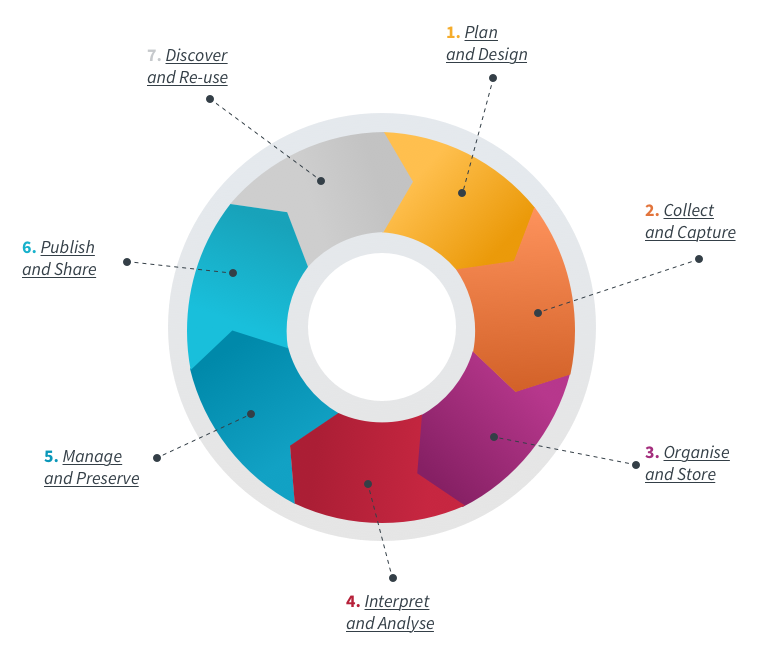
How do we support you?
First of all, our website offers a one-stop shop for digital tools, training and events. You can browse through the different tools that the University offers, see if there is relevant training and read up on case studies describing how these tools have been used by researchers before.
If you have specific questions or require tailored support and advice, you can get in touch with one of our team members. We are a small team of 3 people, each with expertise for one of the three colleges:
- Eleni has a background in digital humanities. She has been a research facilitator for a number of years now and is the first port of call for researchers at the College of Art, Humanities and Social Sciences;
- Andre has a background in civil engineering, both in industry as well as in academia. He is there to support researchers in the College of Science and Engineering;
- Sarah has academic and hands-on experience in the medical field. She is here to assist with queries from the College of Medicine and Veterinary Medicine.
We work closely with technical experts of various service providers and have contacts across the University. This means that if we can’t answer your question ourselves, we will find someone who can.
Finally, we have a range of exciting events coming up! These can help you further your digital skills, grow your network and exchange ideas.
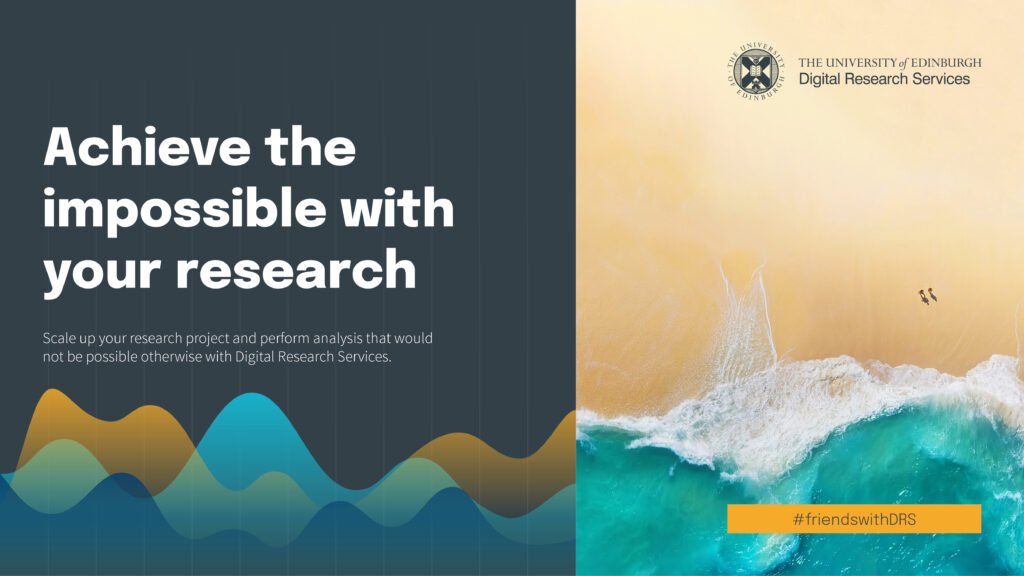
Upcoming events in Semester 2
Early Career Researcher Forum
The Early Career Researcher Forums provide a platform to exchange ideas, develop a network and explore opportunities on topics relevant to digital research. Members of the forum can propose a theme and lead discussions based on their research interests. These may include: the creation of digital management plans; use of various digital tools and resources; data storage/preservation/sharing; publication of research outputs; open publishing; etc.
The forum is open to Early Career Researchers and PhD students at the University across all schools – the aim is to encourage interdisciplinary dialogue and networking. The Research Facilitation Team will be present to help lead the sessions. Sign up here.
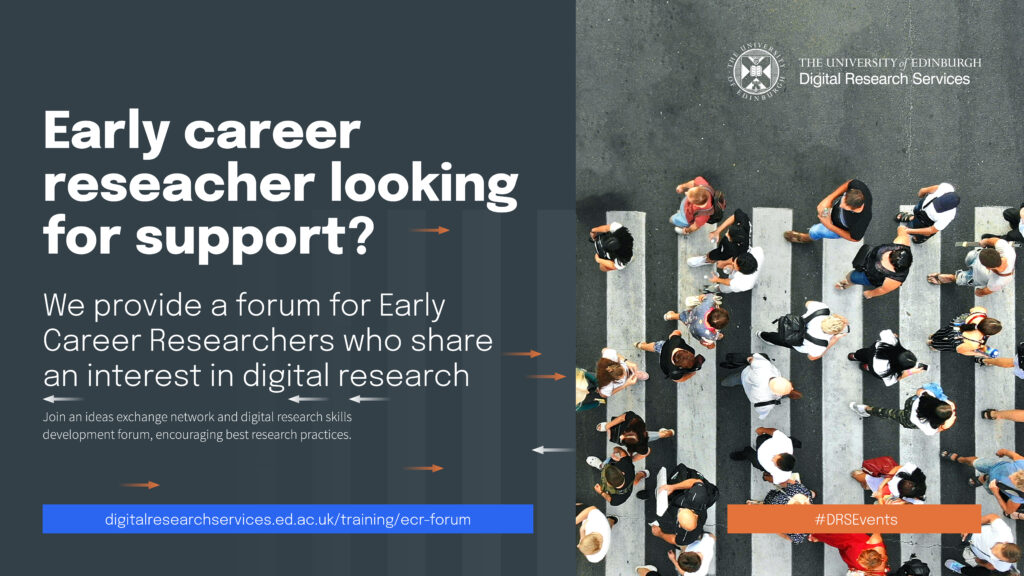
Digital Research Ambassador Internship Scheme
After a successful run in the previous years, Digital Research Services are planning another fully funded internship scheme. We will be matching interns – postgraduate students with strong digital research, data and computing skills – with host projects across the University.
- As an intern, you will bring in data and research compute expertise, contributing to digital skill development and project planning. In addition, you will gain hands-on interdisciplinary research experience.
- As a host, you will get support and gain new perspectives in using digital tools and services. You will develop additional dimensions to your digital research plans and inspire a new generation of researchers.
If you would like to take part, please register your interest here so we can plan accordingly. More information, including previous projects, can be viewed here.
Lunchtime Seminars
The seminars are open to all, and will cover a wide range of themes and research services. They will help you gain awareness of digital research services, learn the fundamental aspects of the digital research life cycle and discover the challenges and opportunities of data and computing services.
There is a mini networking session immediately before each lunchtime seminar.
The themes for Semester 2 are as follows:
- Organise and Store |30th March 2023. Book your place here
- Publish, Share and Preserve | 28th April 2023. Book your place here
- Interpret and Analyse | 17th May 2023. Book your place here
Keep in touch!
You can also stay up to date by joining our mailing list and following our Twitter and LinkedIn pages.
Link to our website: Digital Research Services at the University of Edinburgh
Link to our brochure: DRS Facilitation – UoE Digital Research Services Brochure DIGITAL.pdf – All Documents (sharepoint.com)
Sarah Janac
Digital Research Services Facilitator
Information Services

 One of the ambitions for the EOR conference held in March, 2022, when we first started planning it was to make it as open and accessible as possible. To achieve this we made the whole event hybrid so that plenary talks, posters, and workshops were all accessible on the day to both in person and remote attendees. While this generally worked very well for both remote and in-person attendees, we also wanted to make it available to people who couldn’t attend on the day – so we recorded everything, and the recordings of the talks and posters can now be openly accessed through our Edinburgh Open Research journal at
One of the ambitions for the EOR conference held in March, 2022, when we first started planning it was to make it as open and accessible as possible. To achieve this we made the whole event hybrid so that plenary talks, posters, and workshops were all accessible on the day to both in person and remote attendees. While this generally worked very well for both remote and in-person attendees, we also wanted to make it available to people who couldn’t attend on the day – so we recorded everything, and the recordings of the talks and posters can now be openly accessed through our Edinburgh Open Research journal at 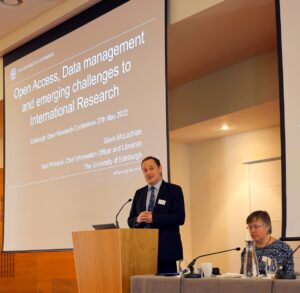 Attendees online and in person were treated to a fine and varied selection of talks. To begin with, topics ranged from Gavin McLachlan’s overview of current national and international political contexts and Dominic Tate’s review of the University’s Open Research Roadmap, to the latest in open access publishing from Rebecca Wojturska and Dominique Walker, FAIR principles from Susanna-Assunta Sansone, and Eugenia Rodrigues on inclusivity and Citizen Science.
Attendees online and in person were treated to a fine and varied selection of talks. To begin with, topics ranged from Gavin McLachlan’s overview of current national and international political contexts and Dominic Tate’s review of the University’s Open Research Roadmap, to the latest in open access publishing from Rebecca Wojturska and Dominique Walker, FAIR principles from Susanna-Assunta Sansone, and Eugenia Rodrigues on inclusivity and Citizen Science.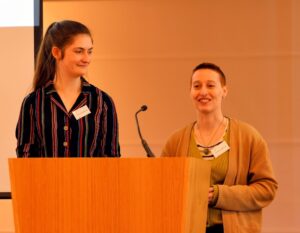 Nicely complementing Madeleine’s study, Emma MacKenzie and Felicity Anderson gave us the benefit of hands-on experience. Speaking from either side of the student-supervisor relation, they described their use of open source tools, materials, and mind-sets in student projects. Here, too, we saw the development of core competencies, this time including the documentation, discussion, and resolution of errors.
Nicely complementing Madeleine’s study, Emma MacKenzie and Felicity Anderson gave us the benefit of hands-on experience. Speaking from either side of the student-supervisor relation, they described their use of open source tools, materials, and mind-sets in student projects. Here, too, we saw the development of core competencies, this time including the documentation, discussion, and resolution of errors.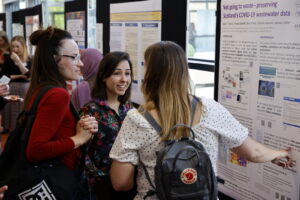 There were also poster sessions, culminating in first prize for Livia Scorza’s ‘Not going to waste – preserving Scotland’s COVID-19 waste water data,’ and there were workshops covering everything from public engagement to Open Research and AI.
There were also poster sessions, culminating in first prize for Livia Scorza’s ‘Not going to waste – preserving Scotland’s COVID-19 waste water data,’ and there were workshops covering everything from public engagement to Open Research and AI.